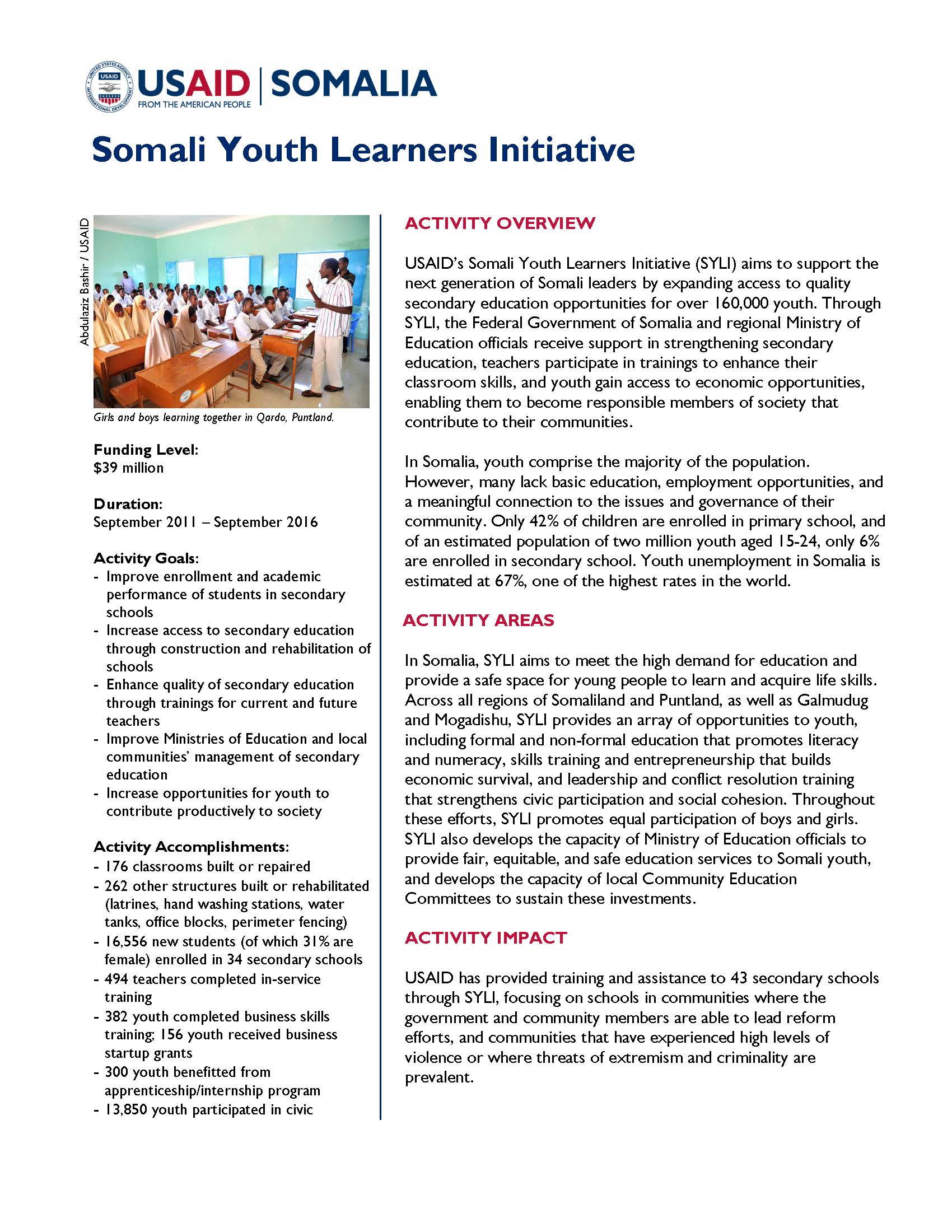Somali Youth Learners Initiative ![]() (pdf - 130k)
(pdf - 130k)
Funding Level:
$39 million
Duration:
September 2011 – September 2016
Activity Goals:
- Improve enrollment and academic performance of students in secondary schools
- Increase access to secondary education through construction and rehabilitation of schools
- Enhance quality of secondary education through trainings for current and future teachers
- Improve Ministries of Education and local communities’ management of secondary education
- Increase opportunities for youth to contribute productively to society
Activity Accomplishments:
- 176 classrooms built or repaired
- 262 other structures built or rehabilitated (latrines, hand washing stations, water tanks, office blocks, perimeter fencing)
- 16,556 new students (of which 31% are female) enrolled in 34 secondary schools
- 494 teachers completed in-service training
- 382 youth completed business skills training; 156 youth received business startup grants
- 300 youth benefitted from apprenticeship/internship program
- 13,850 youth participated in civic participation activities
Implementing Partner:
Mercy Corps
Key Partners:
Ministries of Education
Community Education Committees
Activity Locations:
Puntland
Somaliland
South Central Somalia
ACTIVITY OVERVIEW
USAID’s Somali Youth Learners Initiative (SYLI) aims to support the next generation of Somali leaders by expanding access to quality secondary education opportunities for over 160,000 youth. Through SYLI, the Federal Government of Somalia and regional Ministry of Education officials receive support in strengthening secondary education, teachers participate in trainings to enhance their classroom skills, and youth gain access to economic opportunities, enabling them to become responsible members of society that contribute to their communities.
In Somalia, youth comprise the majority of the population. However, many lack basic education, employment opportunities, and a meaningful connection to the issues and governance of their community. Only 42% of children are enrolled in primary school, and of an estimated population of two million youth aged 15-24, only 6% are enrolled in secondary school. Youth unemployment in Somalia is estimated at 67%, one of the highest rates in the world.
ACTIVITY AREAS
In Somalia, SYLI aims to meet the high demand for education and provide a safe space for young people to learn and acquire life skills. Across all regions of Somaliland and Puntland, as well as Galmudug and Mogadishu, SYLI provides an array of opportunities to youth, including formal and non-formal education that promotes literacy and numeracy, skills training and entrepreneurship that builds economic survival, and leadership and conflict resolution training that strengthens civic participation and social cohesion. Throughout these efforts, SYLI promotes equal participation of boys and girls. SYLI also develops the capacity of Ministry of Education officials to provide fair, equitable, and safe education services to Somali youth, and develops the capacity of local Community Education Committees to sustain these investments.
ACTIVITY IMPACT
USAID has provided training and assistance to 43 secondary schools through SYLI, focusing on schools in communities where the government and community members are able to lead reform efforts, and communities that have experienced high levels of violence or where threats of extremism and criminality are prevalent.
SYLI collaborated with education authorities in providing education services for 16,556 (11,397 males, 5,159 females) secondary school-aged students across Somalia. To increase access to education, 79 classrooms were completed in addition to 126 other structures, such as science laboratories, latrines, libraries, and administrative offices. The additional classroom space enabled more students to attend classes and provided a more conducive learning environment, thus increasing both access to and quality of education.
USAID’s education assistance in Somaliland and Puntland resulted in outstanding completion rates for the 2013/2014 academic year, which averaged 99.5% for boys and 95.7% for girls. This demonstrates that when given the opportunity, young people want to go to school and want to stay in school.
Access to education also requires providing the essential tools for teaching and learning. With USAID assistance through SYLI, 2,025 textbooks and other teaching and learning materials were provided. USAID also continued to sponsor 81 female teachers for pre-service training and 494 for in-service training at qualified teacher training institutes across the country. The trainings focused on student-centered learning and classroom management skills as well as English, mathematics, and sciences.
To build Somali capacities, SYLI trained and supported staff from the Ministries of Education in Mogadishu and Galmudug to carry out public tendering processes for school construction. Potential contractors from the community were invited to bid for contracts and were assessed based on predetermined criteria in a blind review session conducted by the Ministry and USAID’s implementing partner. In both cases, the Ministries had never carried out a public tendering process before and vowed to do so for all future construction activities. Promoting transparency is critical for building trust in local authorities as well as for promoting equity.
To create incentives for youth to work, SYLI integrated skills development training with innovative technology for the benefit of 232 youth. Of the 232 youth who graduated, 125 youth micro-entrepreneurs and youth-owned microenterprises were given small business grants to start their own businesses. An additional 100 youth were placed in apprenticeships following completion of workforce development programs, positioning them for longer-term employment.
USAID Contacts:
Tyler Beckelman, Director
USAID Somalia
Tel: +254 20 862 2834
Email: tbeckelman@usaid.gov
Marybeth McKeever
USAID Somalia
Social Services Team
Tel: +254 20 862 2191
Email: mmckeever@usaid.gov
Somali Youth Learners Initiative:
Olad I. Farah
Chief of Party
Mercy Corps Somalia/Somaliland
Tel: +252 634 017 890
+252 633 674 420
+252 616 764 343
+252 907 793 048
+254 726 444 014 (Nairobi)
Email: ofarah@so.mercycorps.org








Comment
Make a general inquiry or suggest an improvement.